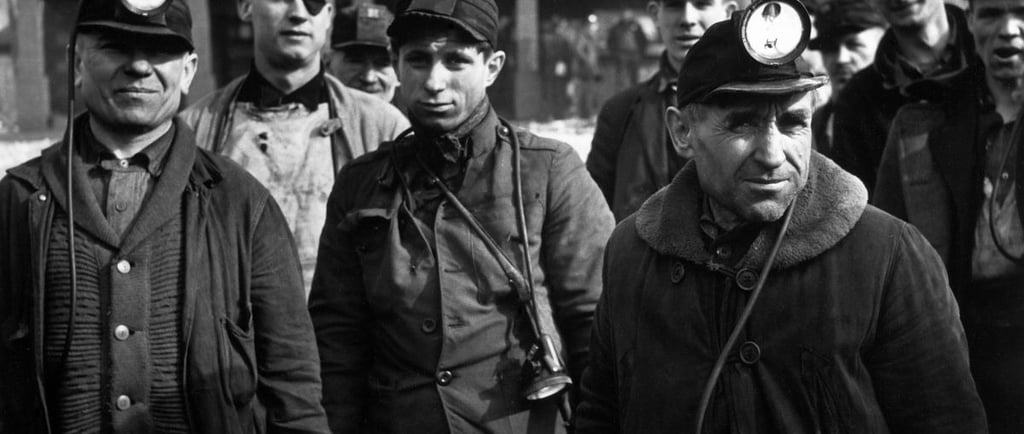Fake Money Redeemed in Real Blood
Company scrip in early American industry
CAPITALISM
Daniel Donnelly
8/3/20254 min read


The steamboat ferry was ready to depart the quay at Fulton Street as soon as the recruiter had “souped” the prospects. Hardy stock from Austro-Hungary required hardier stock in the bowls. From there they would embark for Bayonne in New Jersey, then up the Raritan River for base camp. Thence the teamsters’ carriages would complete the trip to the hills around Allentown, chock full of Pennsylvania’s black gold!
The group’s final destination was a village in Carbon County, PA. Coming from Manhattan’s Fulton Street, it was a sharp contrast. Cobbled streets gave way to mud pathways rutted by the daily passage of scores of miners and mules. Fulton Street’s commercial edifices of sturdy brick gave way to dreary slate-roofed cabins, constructed side by side in perfectly straight lines. There was a lot of bustle – wagons hauling supplies one way and carts on tracks transporting the anthracite another way – but no frills beyond that. Coin which would have been wasted at a Southstreet Seaport cabaret would instead go towards the occasional pot of moonshine, distilled by friendly neighbors along the Susquehanna. After two stiff draughts and through a teary squint, life in these hills almost resembled what the recruits had known in their Carpathian homeland.
One edifice which stood out from all the others was the company store. At just two stories, it was not that much taller, but it was wide and capacious. Upstairs was used as the village’s post office, staffed by company employees. The edifice displayed a certain permanence unseen in the village’s other structures. Its wooden siding’s bright red paintjob almost seemed to smirk.
It was here that the recruits were first brought upon arrival. The recruiter then asked them whether they had brought their own helmets, pickaxes, lanterns and shovels. It struck the recruits as a bizarre question coming from someone who had been intimately travelling with them for a week now. Surely the recruiter had noticed that they had not packed pickaxes into their táskák, or travelling satchels. Of course the recruiter had noticed this, but he had to ask as a legal formality, for the company store’s clerk recorded all the mining equipment which was issued to the recruits. A bill would be produced for each of them from this list. The clerk would then add the individualized costs of transportation; steamboat passage, teamster fees, recruiter’s bonus. Hell, even the bowls of soup back in Manhattan were itemized! This was the debt which the recruits would work off, along with that for their housing in the village’s cabins.
On account of the village’s remoteness, United States currency was scarce. There would be no horse-relays by Wells Fargo to rush bank reserves to and fro. For this reason, the company would often pay in its own currency, called company scrip. These were bills onto which denominations and serial numbers were stamped. Coins were also circulated, amalgamated with copper and perforated in the middle with the company’s initial. The rhythmic clink of a pocketful of these coins vaguely reminded the recruits of the crack of whips wielded by the csikós, Hungary’s celebrated horsemen in the vast grasslands of the Puszta.
Every month the recruits would draw their wages in scrip, from which a portion went towards their debt. The recruits had some leeway in how much they could apportion towards the debt, deciding whether to repay it sooner or later, but it hardly mattered. The only things to buy around the village were sold at the company store; paraffin for the miners’ headlamps, work boots, soap, hairbrushes, etc. The company store was the only place which had them, and then at high prices. It seemed that no matter how much the miners scrimped and saved, they were wallowing in debt peonage to the company store.
Nor was the company scrip very useful elsewhere. If a local farmer came by selling eggs, he would accept the scrip as payment, but only at a reduction of 30% since he in turn could only redeem it at the company store, which often did not sell what the farmer needed. The more adroit of the recruits seemed to suspect that the company kept track of the scrip bills in circulation, to price its store’s merchandise depending on how much scrip was on the miners’ side of the counter.
Many did not survive the colliery’s hazardous work through the years. In the mines, there were natural collapses and subsidences, asphyxiations by odorless and invisible carbon monoxide, mistimed detonations of nitroglycerin, drownings by flash inundations, random fights with other desperate men, and a slow death by the black lung. But those who did live long enough finally saw commerce improve in the region.
First came the canals in the 1830s. New York’s Erie Canal completed in 1825 had linked the state’s west and center with its Hudson River, debouching southwardly into the Atlantic at New York City. The Commonwealth of Pennsylvania sought to emulate this success by linking the western industrial hub of Pittsburgh with Philadelphia in the southeast on the Delaware River’s shore.
Though the Commonwealth had proposed the ambitious project, it was private industry which responded for the execution, competing for contracts to excavate and operate the canals along four interconnected divisions. Simultaneously in some instances, railroads were constructed along the canal lines to assist in the portage of provisions and personnel. The smoke-belching locomotives coursing along these railbeds would be powered mostly by the anthracite extracted by our homesick miners.
As competing goods and services became more plentiful in the region, the miners increasingly objected to payment in company scrip. Wages of $100 in company scrip would fetch elsewhere only $60 worth of goods, so it made less sense to accept payment in scrip. Nor would the miners pay inflated prices for the company store’s wares when the miners could find better equivalents in nearby shops. If the company threatened to dismiss complaining miners, they could easily find work with a direct competitor.
The recruits’ American-born grandchildren, raised in the rugged Pennsylvanian hills which their grandsires had tamed, knew a bad deal when they saw it. Keenly they understood that “company loyalty” worked both ways. The company quickly realized that it no longer held the upper hand, so it acceded to the miners’ demands for fair payment in real cash.
The great-grandchildren inherited a world of leisure, safety and comfort which would have been inconceivable to their forebears. In their lives of nearly limitless opportunity, they would never fully understand what dangers and sacrifices had been endured to bequeath such a world to them. Eventually they would forget that so much of it started with some fearless honfitársak (countrymen) who boarded a boat to conquer a continent.
